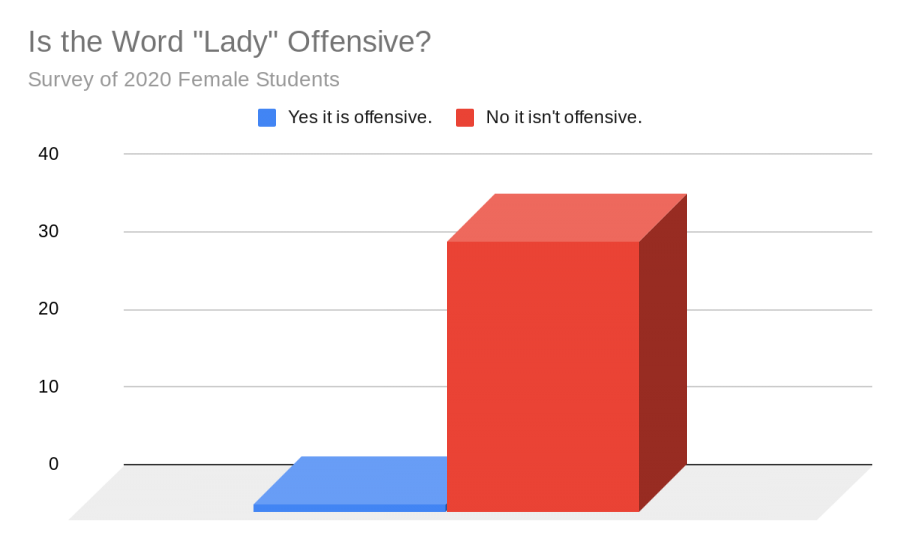“Lady”: Offensive or Empowering?
Our nation is currently going through a metamorphosis. As we update the “Politically Correct” list that determines social norms a few questions remain unanswered for me. I am fascinated with the debate surrounding the words “lady,” ”girl,” and “woman” and their use as adjectives. If you don’t understand what I am describing, here are a few examples: “woman doctor,” “Girl Scouts,” and since you are most likely from Galway: “Lady Eagles.”
As a quick disclaimer, the sources I use in the article are not reputable. They are not to be taken as fact, my opinion, or the opinion of women as whole. The debate surrounding using the word “Lady” and others as adjectives is young and therefore everything within this article is solely the opinions of various people and are not to be interpreted as anything else.
When I pose these philosophical questions to myself, I begin my search for answers in a highly frowned upon manner. I search my question and click the first result that comes up regardless of its domain ending. Although you should not do this with serious research papers, I find that with social issues, using the Google search algorithm gives you an advantage as a writer because the first few links will give you a lot of insight into the current political atmosphere surrounding a given topic. The first website was Hello Clue and it featured a blog-like post. It brought up the definition of “Lady” compared to the definition of “Gentleman” and claims that the contrasting definitions are where the offense lies. However, a quick Google search shows how the website picks and chooses their information.
Google Definitions: I personally think that if we’re calling definitions sexist the gentleman one is at fault in this scenario.
Lady – “a woman”
Gentleman– “a chivalrous, courteous, or honorable man”
Dictionary.com Definitions: These are both outdated, no contrast between them.
Lady – “a woman who is refined, polite, and well spoken”
Gentleman – “a man of good family, breeding, or social position”
Hello Clue Definitions:
Lady – “a woman who is refined, polite, and well spoken”
Gentleman – “a chivalrous, courteous, or honorable man”
If you don’t understand what I’m getting at with those sortings, Hello Clue took the outdated definition of Lady from dictionary.com and the glorified definition of gentleman from Google and then stated them both as Google definitions; making the definition of lady sound sexist. If both Google definitions had been used, no point would’ve been made. Similarly, using both outdated Dictionary.com definitions would supply no argument.
Owning the Power
Okay, definitions aside. Let’s pretend that the definition of lady in inherently sexist and the definition of gentleman isn’t. You can not control other people’s words under the first amendment freedom of speech. So the solution? In my personal opinion we should take the power back. If you believe that lady is a demeaning term then change it. We can’t hide from words, if we could no people wouldn’t walk outside. Most importantly, you can’t sue a word. A word did not create itself: it has no conscience or malicious intent. However if you truly feel uncomfortable, change the perspective and grow a new culture around the word Lady. Rather than giving antagonists the bait by getting upset, acknowledge how amazing it is to be a “Lady” and the talents that come with it. Another argument I see a lot is that we shouldn’t differentiate gender with sports, etc. To that I would ask “why?” Women and men are different biologically and have different strengths and weaknesses. I think these differences should be celebrated, they make us unique. Or, take my personal favorite approach. Don’t care. Call me a Lady in a patronizing way and you will have shown me everything I need to know about your character, and I’ll prevail. Call me a lady with the intention of raising me up, and I’ll like you all the better for it. Call me a lady because you’re simply categorizing by gender, and I won’t fault you.
I used the pronoun “I” for the majority of the last paragraph. That was not the original intention of this article, but the internet failed me. For this piece I had to abandon my usual style of quoting sources, simply because none of them are worth quoting. Most sites were “rinky dink” formats in which random internet users argued this topic. No offense to reddit user45379, but I don’t care about your opinion. This is a conversation I wanted to have with Galway students, so I did.
A few weeks ago I asked the question “Is using the word lady or words like it as adjectives offensive, for example Lady Eagles?” The polls and responses were counted through my Instagram. I took the responses very seriously, (sorry boys your responses did not count, I wanted a female graphic). Double accounts also were only counted once, and for the sake of gathering a current understanding, alumni were also not counted. People from other schools, for obvious reasons, were also excluded. The results are below.
36 Galway female students voted. That works out to be 97.2 of the sample who found the word “Lady” not offensive, and 2.7 thought it was offensive. I’m not going to ignore the obvious, only one person said that in their opinion the word is offensive. I applaud them for exercising their freedom of speech and we will hear from them later in this article.
This article was intended to be a conversation, so everyone was also prompted to send in a sentence or two on why their opinion is what it is. Here are a few. Note: Some responses are edited for clarity and grammar, and school appropriateness.
“It’s tradition, we’ve been called Lady Eagles since the start, why should we change?”
~This would not be my personal argument defending the word since many disgusting words used to be tradition, but I understand the sentimental value of the word in our community.
“It’s a word for women. If you are on a women’s sport team you should be able to be called that.”
~I personally like this take on the word in this context. Maybe it’s just a word to differentiate gender and you shouldn’t interpret it as anything else. The google definition of lady was simply, “a woman”.
“We’re the Eagles but, we’re girls so I think saying Lady Eagles is okay”
~Same sentiment as the quote before. There were two more responses just like this one.
“It’s on some clothing I own, I don’t want to be yelled at just because the rules suddenly change”
~I thought this was an interesting response that shows that change is not a concrete thing. The world isn’t going to wake up one day and completely erase the use of a word.
I also had a quick conversation with an alumni:
“I can understand and respect how the world is a lot more intolerant of offensive language and has been paying a lot more attention to what is offensive towards certain groups. It has helped with equality. However, there comes a point where the line of reasonably being offended is crossed into getting offended over something very small.”
~This was also an opinion that I thought was highly intelligent. This line of what is offensive keeps moving and at some point you have to look at the world and decide what battles are worth fighting.
Finally this response resonated with me:
“I don’t find it offensive, but I see no point in saying “Lady Eagles,” just say “Eagles”
~I can see where this person is coming from. I don’t find it offensive, but also I don’t really shout “Lady eagles” at girls’ games. We differ in that I do see a point in saying it as a kind of “girl power” bringing women up standpoint.
Most of those responses agreed with my standpoint surrounding the word “Lady.” However, it wouldn’t be fair to put out this article without the opposing viewpoint being expressed. I reached out to the student who voted that “Lady” is offensive and asked if they would be willing to write an anonymous response. Here it is:
“I don’t particularly like the term “Lady Eagles” when describing the Galway girls’ sports teams because it gives the impression that they are separate from the boys’ teams. I believe that referring to the girls as “Lady Eagles” suggests that they aren’t fully Galway Eagles. Naming female athletes ladies as opposed to simply athletes can be belittling. I would prefer it that both female and male sports teams be thought of the same way.”
~I understand where this person is coming from, although I disagree. I would want the girls’ sports teams to take back the power if they deem the word offensive. Although I differ in opinion from this person, I am glad that they provided us with a different view to think about.
Overall I believe that making a word taboo, that has been used for centuries, only sets back the feminist movement when it could be used for good, but that’s just my opinion. Thank you to all students who participated in this conversation by sharing their view. Questions like these will always be a matter of opinion, so anyone in Eagle Nation who would like to share their opinion feel free to comment below.

Anna enjoys writing thought provoking articles and is also one half of the "Anna Show". She participates in volleyball, track, robotics, jazz band, GTV,...


salvatore difranco • May 19, 2022 at 7:36 pm
Great commentary as I was scolded for calling the “women” in my office “ladies ”
Which I think, as you said is a very polite well deserved, non demeaning way to address them.